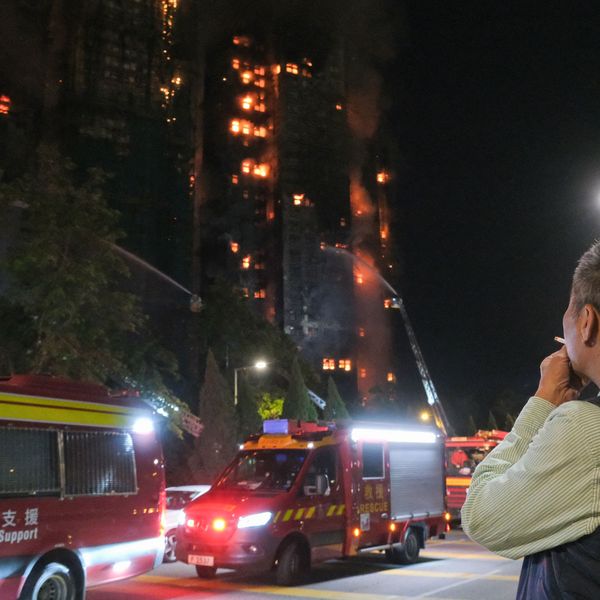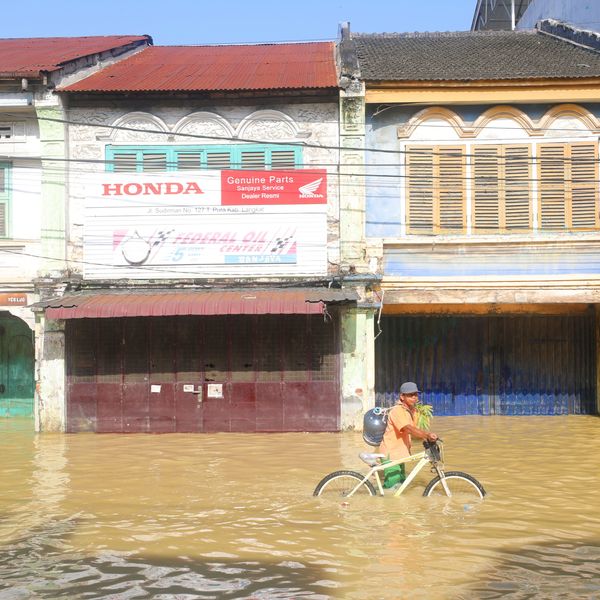As the death count surpassed 700 people on Tuesday, Bangladeshi workers and survivors from the Rana Plaza factory collapse more than two weeks ago took action against the factory owners by staging a massive public protest, blocking a major highway and demanding pay for their labor and compensation for injuries suffered.
As the rubble has slowly been removed since the factory collapse on April 24, the death toll is expected to rise even further at the site of the worst such disaster in the country's history.
Though a global outcry has gone up around the world over the deplorable and unsafe working conditions throughout the garment industry in Bangladesh, on Tuesday the factory survivors took direct action for themselves.
As Agence France-Presse reports:
Police said around 400 survivors blocked a highway connecting the capital with the country's south and southwest on Tuesday by staging a sit-down protest.
The workers were chanting slogans, demanding "unpaid salaries and compensation", local police chief M. Asaduzzaman told AFP.
And The Daily Star in Bangladesh adds:
Shyamol Kumar Mukherjee, additional superintendent of police of Dhaka, said hundreds of workers along with their relatives blockaded the highway about 11:00am and started demonstration as BGMEA is yet to pay their salaries.
The agitated workers withdrew the blockade at noon after officials of district administration assured them of taking steps in this regard, he said.
With promises of payment secured, however, it remains unclear what fundamental and systemic changes will be made to the industry. Though the largest in its history, the country is not new to workplace disasters as the highly competitive international garment industry places enormous pressure on countries to provide cheap workers and ever-faster production schedules.
The question for many is whether or not this latest incident will be enough to cast off the industry's seemingly intractable resistance to reform.
Comparing the Rana disaster to the Triangle Shirtwaist factory fire that claimed nearly 150 New York City garment workers in 1911, history professor Richard A. Greenwald and filmmaker Michael Hirsch argue in a Los Angeles Times op-ed on Tuesday that it was not the fire and resulting deaths that made the Triangle disaster such a memorable moment for labor rights in the US.
What made that disaster potent politically and historically, they argue, was the way other workers, including many of the survivors, responded to it. Writing of the fire:
We remember it not because of the deaths -- as workers sadly died regularly in American industry -- but because we were made to confront it. Garment workers refused to silently go back to work. Their massive protests and collective anger forced middle-class consumers to see their own culpability, and together they sought political change.
This change brought new safety and health codes, labor law reforms and modern regulations to an often primitive industry. What started as reforms for garment workers ended as reforms for all workers in New York and made the state a model for the nation. The simple fact that all of this was the result of workers exercising their rights gets missed in the telling of the Triangle story, as too much attention is paid to chained doors or building code violations, some of which is or becomes urban myth and deflects from the truth.
With workers demanding their rights in Bangladesh and with new determination by Western nations--where consumers, business owners, and politicians must shoulder the blame for legitimizing the global sweatshop industry--observers and labor advocates hope the Rana disaster will sow the seeds of true systemic reform.
As Greenwald and Hirsch conclude, "Rana should be our global Triangle fire moment. It should force us to wake up and as consumers support the workers who make our clothes. It is our moral responsibility to demand that the labels we wear not be stitched in blood."
_____________________


